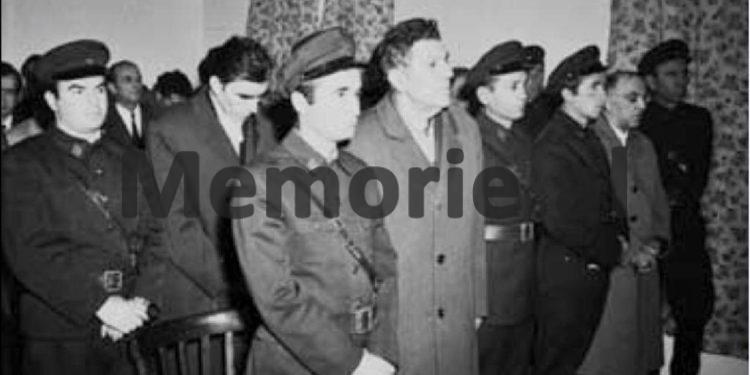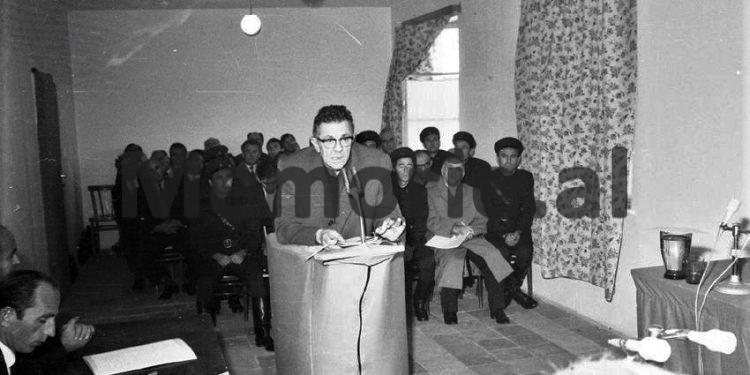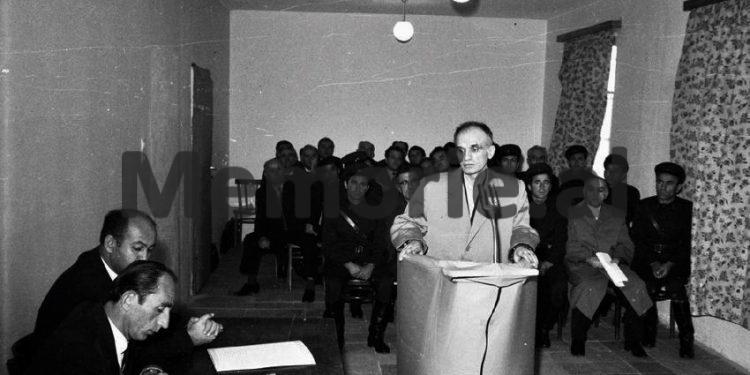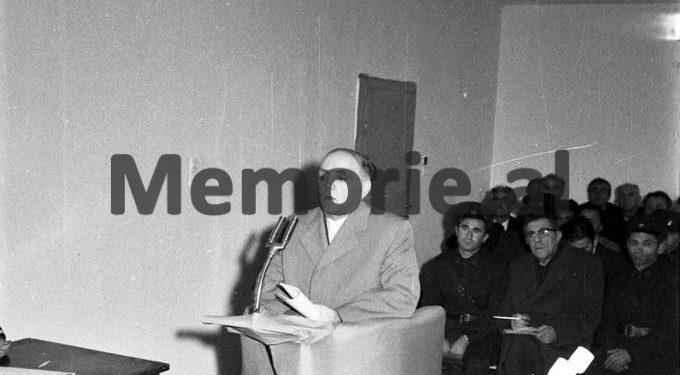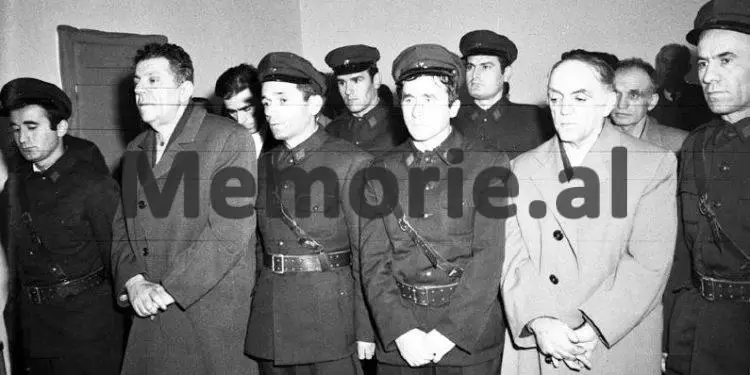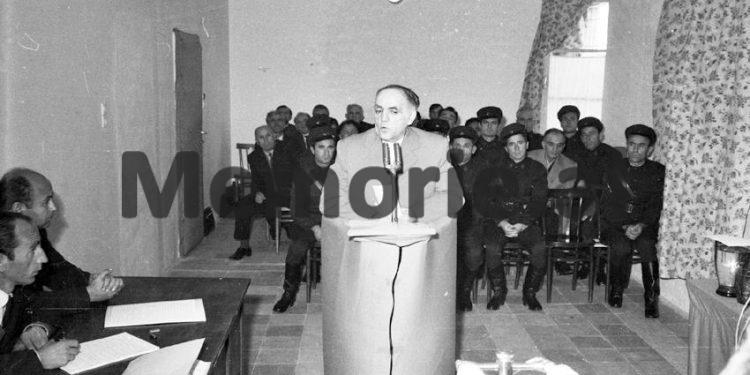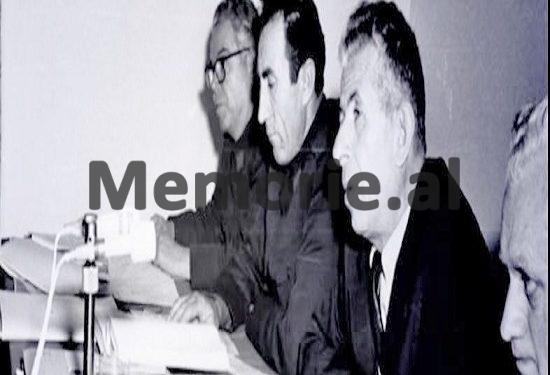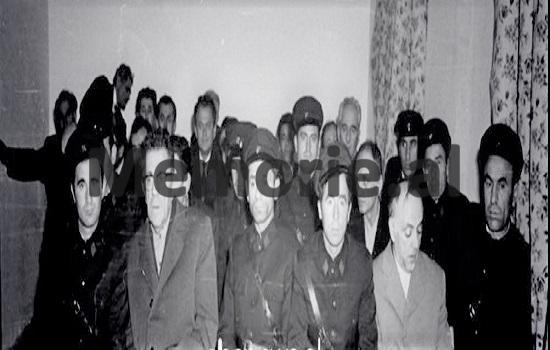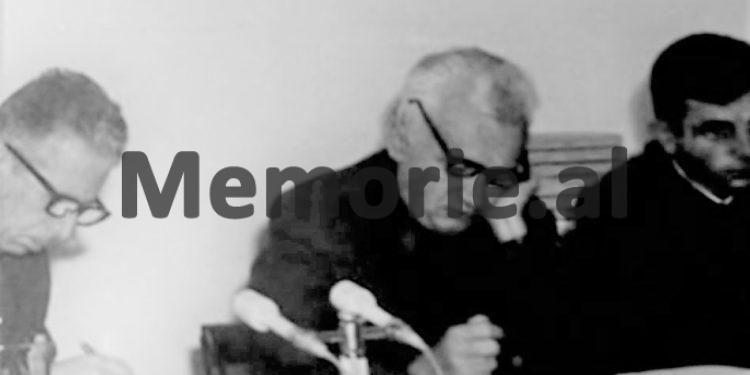By Afrim Imaj
The third part
Memorie.al / “When the trial of Beqir Balluk was taking place and in Tirana no one knew who, a foreign embassy, closely followed the trial sessions at the gate of 313” The rare testimony of Lirim Gjetaj, mostly shows the contours of an unsolved mystery and remains at the limits of an event that has not passed without leaving a trace…! Initially, the soldier from Lezha noticed him with disdain, but only for a few moments. The tension of the judging panel, after the shocking finding about the release of the secret and the suspicion of the regime’s leaders, about a possible link between the putschists and foreign agencies, has included it in the vortex of the nightmare. Lirim Gjeta remembers that he never found out which embassy belonged to the diplomats who closely followed the sensational court sessions, but he remembers that all the movements of the jury were followed “wheel by wheel” by a car with license plates CD.
Continues from last issue
Beqir Balluk’s last words in court: “A plate of gros and a leek”!
“The last wish!”. Aranit Çela and the other judges could not part with the condemned generals without learning the last pledge from their mouths. It was the occasion where Beqir Balluku and others could speak openly. Their clock had already run out and there was no other choice. Lirim Gjetaj, one of the witnesses of these dramatic moments, when he tries to remember the way the generals behaved after the terrifying appeal, stops a little, as if to systematize his thoughts and gets lost in the vision of shocking memories.
“Heavy, very heavy, to hear the last cry of the one waiting to be shot”, says the soldier who was part of the jury in the trial of the so-called coup plotters. So, he begins to describe their condition, trying to reproduce the last stammer of the unfortunate generals. “If I only had a few minutes to live and they asked me what I wanted, I would tell them briefly: I should also learn something new”. It has remained proverbial, the answer of one of the prominent prophets in solving the tempting dilemma, before the fatal moments.
How did the former deputy prime minister of Albania, the tyrant who reached the top of the Albanian executive, react?
After that terrible investigation and inhuman humiliation, what had remained hostage to the famous general who had enjoyed the privileges of the ‘Block’ and had been talked about here, here as the maniac of pleasures? What did he say last, the man who had the manhood to declare that when two eggs meet, one will break, and lo and behold, his egg was broken? With what care did the brave former partisan leave, who had recently recalled the years of battles in which he had participated in his youth and had openly shown that he was a staunch opponent of the “other thesis”, that is, of the “Theory of Slippage” “, which Enver Hoxha had described as a diversion against national defense, inspired by the Chinese.
“I turned from him in those moments”, says Gjetaj. Beqir Balluku closed his tired eyes, stuttering something through his teeth. The eyes started to laugh a little, as much as a man could laugh, physically and psychologically shattered. He looked at us and immediately uttered only two words. “A plate of beans and a pras, oh lal”. Lirim Gjetaj, the man who listened closely to the last words of the former Minister of Defense, interrupts the story again, to continue with the many dilemmas he experienced after that.
What did Beqir Balluku mean by this? Request of a man with gluttonous mentality?
Challenge of a different nature, like that of the legend of the comb before the rope? Desire of the party man, to enjoy himself once more before death? An indirect blow to the system that was taking his life, reminding him that he had come from the mat, that he had suffered like the people, that he was his man, of beans and pigs…?!
How did the last dialogue go, with the former Minister of Defense in the courtroom…! Do you remember how many days the process of the generals lasted?
As far as I remember about 10-12 days. It started there at the end of October and closed at the beginning of November. Dozens of hearings were held, dozens of witnesses were called, numerous and various types of evidence were presented. It was tiring, very tiring, especially for me. To be honest, the whole time I was kind of numb. The fact that I did not understand the content of the cases well and the total isolation that was imposed on me, even outside the court sessions, created a nightmare state for me, full of stress and exhaustion. I was a soldier, I had taken the oath in front of the flag, and this meant strict implementation of the duty, otherwise, the consequences were extraordinary…!
What do you mean when you say you were isolated even outside the court process?
From the first day when I was called from the Zall-Her department and informed of my participation in the judging panel, I was obliged to stay away from contact with people. This meant that apart from being present in the courtroom during the hearings, I had to spend all the rest of my time within the four walls of one of the rooms of the military police building in Tirana. Even there with a guard at the gate.
It wasn’t about going out in the city, talking on the phone with family, or meeting friends. Until the process was over, I had them strictly prohibited. Movements forced to follow the agenda of court sessions were, in all cases, controlled and in the presence of selected companions. For a young man, this kind of regime was almost suffocating, but he had to face it anyway, always in the name of duty…!
Did all the sessions of the judicial process against Beqir Balluk and other generals in ‘Prison 313’ take place?
The whole process, from start to finish was done there. The defendant generals came handcuffed from their cells that were only a few meters away from the courtroom. We, the members of the trial body, the prosecutor and the security personnel, used to go there from the Supreme Court and when the next session was over, we would go back to Arani Çela’s office to prepare for the next session…!
Is it true that court hearings took place late at night and continued until dawn?
None of the sessions of the process took place at night. Every day, they started at 8 am and continued normally, according to the established procedure. The process never took more than eight hours a day. So, the rumors that the trial of the generals took place late at night are not true.
It is said that during the process there were heated debates between the defendants and the jury…?!
In a sense, the whole process was a debate, a confrontation between the two sides, but in general there were no heated clashes as spoken about here. The generals came there after an extraordinary effort, during the one-year investigation in conditions of complete isolation. This was immediately noticeable, especially from the suffering faces and the faded look of their gaze.
Likewise, psychologically, they looked shattered. However, the way they listened and dialogued with the representative of the prosecution and the judges, let you understand that they were sober, despite the fact that here and there they lost their patience and slipped from the course of the case…!
So, they saved the content themselves…?
In general, as I recall, they appeared cautious in all their responses and interventions. In all that marathon of sessions, there were moments when one of them lost self-control. Yes, just for a moment, especially when it came to some serious accusation, such as the one about the coup d’état and the elimination of Enver…!
What do you mean when you say that the generals had occasions where they lost their temper in the process?
There were only a few such, a few sporadic episodes that started and then went out. Among them, I remember a clash between the chairman of the court and Beqir Balluk. It was an argument of the prosecution, talking about the coup d’état that the generals were going to do. Aranit Çela, angered by the negative attitude of the former Minister of Defense, turned to him angrily: “You are trying in vain to deceive Beqir Balluku. The party and Comrade Enver, burned the plan in their pocket and brought you here as a coup plotter. You know what awaits you, don’t you?”?!
How did Beqir Balluku react?
“I didn’t make a plan; I didn’t have to…”! Beqiri answered on the spot, but Aran took the word in his mouth: “You wanted to hit the wall with your head, you forgot that you were going to break your neck.” “What is this wall, what about a broken neck, what are they doing here?”, Beqir Balluku added indignantly. “They come in, why not, they come in”! Araniti added ironically. “The wall, it’s not like an egg that breaks easily, Comrade President” “Hey Beqir, don’t you give us a little of this work of eggs”? So Beqir Balluku, got back on his feet and with a calm tone, laid him back down. “As for the eggs, yes, they break. They break when they collide with each other. Yes, not all. The strongest endure. So, right?! This happened to my egg too?! It collided with Enver’s and broke. Surely this would happen, otherwise…”! Here Aranit’s patience could not be restrained. I remember that, banging his fist on the table, threatening you harshly, he ordered the closing of the session, in a combative voice.
Perhaps you are confusing this episode, since it has been said that the reaction to the story of the eggs in the courtroom was made by Hito Çakua…?!
There is no question of messing it up, because this was one of the most shocking moments, not only for me, who was the youngest among the judges, but also for others. How today I mean Beqir Balluk in this sudden reaction. Yes, yes, I got it right. He went and immediately, he gave it like a volley “Tell Enver that, two eggs that collide, one will break. My egg was weaker and its fate is understood”. For the first time in that process, Enver’s name was mentioned outside of official ethics and in a somewhat dismissive approach. Yes, as I said, Araniti, did not let the situation slip out of his hands and closed the session immediately…!
And the other generals, how did they react to the accusation?
Petrit Dumja, through and through, remained in an affirmative position regarding the errors articulated by the accusation and the many witnesses, but in all cases, he ended his lecture with the refrain “without intention” “without purpose”. More or less, Rahman Perllaku appeared with such a profile, who seemed more hurt by the consequences that awaited him. While Hito Çako, from time to time rebelled and tried to oppose the many accusations. At least that’s how they stuck out to me. 30 years have passed and of course, there is no way I can remember all the details…!
What do you remember from the meeting of the jury to make the decision, who led it and were there other officials in it?
This moment, if I’m not mistaken, came somewhere around the tenth day. Precisely when all the official procedures were finished, Aranit Çela stood up and ordered the withdrawal of the jury to make the decision. For a moment, I thought we were going to enter an office, we were going to discuss it for a long time, but surprisingly, Araniti, as soon as we got out into the corridor, settled in a corner and opened a yellow file that he was holding in his hand. “That’s all there is to this work”, he said on the spot and read the pre-prepared decision for the punishment of the generals. “I believe we have it clear”, – he said at the end and as he saw that there was no contrary opinion, he invited us to enter the hall. There were only the defendants, who as soon as the door was opened, were taken on foot as if on command.
Aranit Çela, as he took his seat, reopened the yellow file once again and communicated in a solemn tone: Decision of the Supreme Court of the People’s Socialist Republic…! Today… Beqir Balluku is sentenced to death (shot)… Petrit Dume is sentenced to death (shot)… Hito Çako is shot to death (shot)…! This whole statement of his did not last more than five minutes. Then, a grave silence took over the hall. Those were terrible moments. For a moment, I glanced at the three generals who had just been sentenced to death. Their faces were completely pale and they looked in complete brackets.
So Aranit Çela, sitting as he was, closed the file he had on the table and handed it to the secretary, uttering something as if through his teeth. When he found that they did not understand what he said, he explained that the procedure required that the defendants express their last wishes. This would apparently be the last contact with them. Beqir Ballukut addressed you first. The monk closed his tired eyes and laughed unconsciously, as much as a physically, morally and psychologically broken man could laugh. I, what I wanted, he added on the spot and as he sat for a few moments thinking he said that; wanted a dish of grosz with a leek.
Enver Hoxha’s cynicism in the Assembly: “What do you say, let’s shoot Beqiri?!
“Hey, what do you say, let’s shoot Beqir Balluku”?! Six months after the execution of Beqir Balluku and other generals, Enver Hoxha cynically requests the approval of the deputies of the People’s Assembly for their shooting (!) The document with this strange intervention is dated May 6, 1976. File with the seal of the communist parliament, has on the first page the agenda of the meeting, whereas the first point, the examination of the letter of Beqir Balluku, Petri Dumas and Hito Çakos, to pardon their lives is foreseen. This was a common ritual according to which those sentenced to death could benefit from the “kindness” of the head of the communist state, who would formally notarize his decision in the country’s highest legislative body.
In the case of the unfortunate generals, sentenced by the Supreme Court by final decision to death (shooting), at the beginning of November 1975, the request was submitted within the deadlines to the cabinet of Haxhi Lleshi and Enver Hoxha, but the fate of bad, with the review after six months, while they had passed away! Undoubtedly, Enver Hoxha knew what had happened to the crucified generals, even in dozens of political gatherings, he trumpeted it loudly: “the mouse hole where the Party put the dangerous putschists”, but he cannot “play” with them. to close it without despising the end of his victims.
Right at the opening of the meeting of the Assembly on May 6, 1976, Enver Hoxha, with a solemn look, was taken from the seat and with a letter in his hand, he addressed the hall: “I have here the request of Beqir Balluk and the other putschists to be forgiven life. What do you say, should we shoot them or not?” So, the hall was filled with silence. Everyone was surprised. What did their leader want, now that the generals had gone to the next world? Was the news about the implementation of the Supreme Court’s decision a farce? Each of them knew the circumstances in which they were executed.
However, Enver could not ask for their approval in vain. “What do you say, should we shoot Beqir Balluk?”, he directed again from the hall. “Comrade Enver, Comrade Enver… the generals seem to me to have been shot. The party has informed us that the court decision has been executed”! Finally, one of the deputies took courage and went to correct his slip. Thus, Enver Hoxha, with a thoughtful look, added: “So, the first item on the agenda has been exhausted. Let’s go to the second point”! After saying this, he sat down quietly and gave the floor to the leader of the session. The shameful comedy, belongs to the session of the communist parliament on May 6, 1976. Memorie.al




